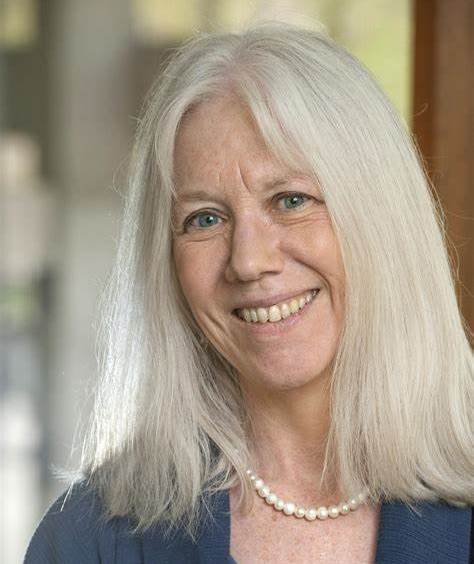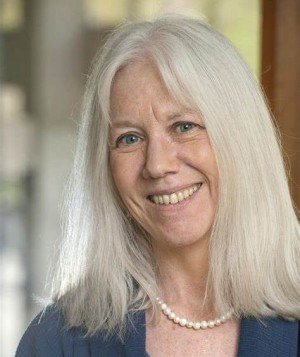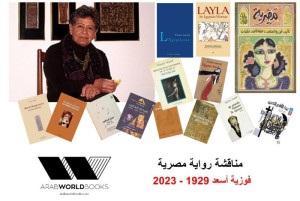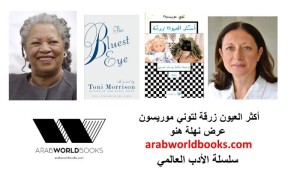Marilyn Louise Booth is an author, scholar and translator of Arabic literature. She holds the Khalid bin Abdallah Al Saud Chair for the Study of the Contemporary Arab World, Oriental Institute and Magdalen College, Oxford. In addition to academic publications, she has translated many works of fiction from Arabic, including The Penguin’s Song and No Road to Paradise, both by Lebanese novelist Hassan Daoud. She translated the 2019 International Booker Prize-winning novel Celestial Bodies from Arabic.
Marilyn grew up in the United States. She spent a year in Beirut, Lebanon at the age of twelve and knew then that Arabic would be part of her future. She graduated summa cum laude from Harvard University in 1978, and was the first female winner of the Wendell Scholarship. She obtained a D.Phil. in Arabic literature and Middle Eastern history from St Antony's College, Oxford in 1985. She received a Marshall Fellowship for her doctoral studies at Oxford. She has taught at Brown University, American University in Cairo, and University of Illinois, Urbana-Champaign. She was director of the Center for South Asian and Middle Eastern Studies at UIUC. She moved in 2009 to Edinburgh as Iraq Professor of Arabic and Islamic Studies, and in 2014 to New York University Abu Dhabi as Senior Humanities Research Fellow before joining the Magdalen community in summer 2015.
Books
Feminist Thinking in Fin-de-siècle Egypt: The Career and Communities of Zaynab Fawwaz - Oxford University Press 2021
Classes of Ladies of Cloistered Spaces: Writing Feminist History through Biography in Fin-de-Siècle Egypt. Edinburgh: Edinburgh University Press, 2015.
May Her Likes Be Multiplied: Biography and Gender Politics in Egypt. Berkeley and Los Angeles: University of California Press, 2001. Translated into Arabic as: Shahirat al-nisa’: Adab al-tarajim wa-siyasiyyat al-naw’ fi Misr. Trans. Sahar Tawfiq. Cairo: Al-Markaz al-qawmi lil-tarjama (no. 1265), 2008.
Bayram al Tunisi’s Egypt: Social Criticism and Narrative Strategies. Exeter: Ithaca Press (St. Antony’s Middle East Monographs no. 22), 1990. Translated into Arabic as: Ard al-habayib ba’ida: Rihla fi a’mal Mahmud Bayram al-Tunis. Trans. Sahar Tawfiq. Cairo: Al-Majlis al-a’la lil-thaqafa [Govt of Egypt], 2002.
(edited collection) Migrating Texts: Circulating Translations around the Ottoman Mediterranean (Edinburgh: Edinburgh University Press, 2019). Introduction based partly on original research; one chapter.
(co-edited collection, with A. Gorman) The Long 1890s in Egypt: Colonial Quiescence, Subterranean Resistance. Edinburgh: Edinburgh University Press, 2014.
(edited collection) Harem Histories: Envisioning Places and Living Spaces. Durham and London: Duke University Press, 2010.
Special journal issues
(with N. Davidson) 25 Years of Revolution: Comparing revolt and transition from Europe 1989 to the Arab World 2014. Special Issue, Journal of Contemporary Central and Eastern Europe 23: 2-3 (August 2015). Introduction, pp. 99-103.
Women’s Autobiography in South Asia and the Middle East: Defining a Genre. Special Issue, Journal of Women’s History 25: 2 (Summer 2013).
(with A. Burton) Critical Feminist Biography. Special Double Issue, Journal of Women’s History, 21: 3, 4 (2009).
Recent Book Chapters and Essays in Refereed Journals
Zaynab Fawwaz’s feminist locutions. Journal of Arabic Literature, special issue ‘The Cultural Turn’, 2021.
Jeanne d’Arc, Arab hero? Warrior women, gender confusion, and feminine political authority in the age of high colonialism. In Boyd Cothran, Joan Judge, and Adrian Shubert (eds), Women Warriors and National Heroes: Global Perspectives. London: Bloomsbury Academic, 2020): 149-77.
Translating Girlhood? Fénelon’s Traité de l’éducation des filles (1689) as a text of Egyptian modernity (1901-09). In Marilyn Booth (ed.), Migrating Texts: Circulating Translations around the Ottoman Mediterranean. Edinburgh: Edinburgh University Press, 2019. 266-99.
Peripheral Visions: Translational polemics and feminist arguments in colonial Egypt. In Anna Ball and Karim Mattar (eds), Edinburgh Companion to the Postcolonial Middle East. Edinburgh: Edinburgh University Press, 2018. 183-212.
Disruptions of the Local, Eruptions of the Feminine: Local Reportage and National Anxieties in Egypt’s 1890s. In Anthony Gorman and Didier Monciaud (eds), The Press in the Middle East and North Africa, 1850-1950: Politics, Social History and Culture. Edinburgh: Edinburgh University Press, 2018. 58-98.
Three’s a Crowd: The Translator-Author-Publisher and the Engineering of Girls of Riyadh for an Anglophone Readership. In Farzaneh Farahzad and Luise von Flotow (eds), Translating Women: Different Voices and New Horizons. London: Routledge, 2017. 105-19.
Women and the Emergence of the Arabic Novel. Chapter 7 in Wa’il Hassan (ed.), The Oxford Handbook to the Arabic Novelistic Tradition. Oxford: Oxford University Press, 2017. 135-53.
‘Go directly home with decorum’: Conduct books for Egypt’s young, c.1912. Chapter 22 in Joseph E. Lowry and Shawkat M. Toorawa (eds), Arabic Humanities, Islamic Thought: Essays in Honor of Everett K. Rowson. Leiden: Brill, 2017. 393-415.
Liberal Thought and the “Problem” of Women. In Arabic Thought beyond the Liberal Age, 1780s-1940s: Towards an Intellectual History of the Nahdah, ed. Jens Hanssen and Max Weiss (Princeton: Princeton University Press, 2016), pp. 187-213.
Fiction’s Histories: Writers and Readers in the Middle East. In Shifting Sands: The Unravelling of the Old Order in the Middle East, ed. Raja Shehadeh and Penny Johnson (London: Profile Books, 2015), pp. 171-84.
Ataturk Becomes ‘Antar: Nationalist-Vernacular Politics and Epic Heroism in 1920s Egypt. In Studying Modern Arabic Literature: Mustafa Badawi, Scholar and Critic, ed. Roger Allen and Robin Ostle (Edinburgh: Edinburgh University Press, 2015), pp. 118-38.
Before Qasim Amin: Writing histories of gender politics in 1890s Egypt. In The Long 1890s in Egypt: Colonial Quiescence, Subterranean Resistance, ed. Marilyn Booth and Anthony Gorman (Edinburgh: Edinburgh University Press, 2014), pp. 365-98.
Islamic politics, street literature and John Stuart Mill: Composing gendered ideals in 1990s Egypt. Feminist Studies 39: 3 (Fall 2013): 1-32.
Insistent Localism in a Satiric World: Shaykh Naggar’s “Reed-Pipe” in the 1890s Cairene Press. Chapter 3 in Asian Punches: A Transcultural Affair, ed. Hans Harder and Barbara Mittler (New York and Heidelberg: Springer Verlag, 2013). Ser. Heidelberg Studies on Asia and Europe in a Global Context. Pp. 187-218.
What’s in a Name? Branding Punch in Cairo, 1908. Chapter 6 in Asian Punches: A Transcultural Affair, ed. Hans Harder and Barbara Mittler (New York and Heidelberg: Springer Verlag, 2013). Ser. Heidelberg Studies on Asia and Europe in a Global Context. Pp. 271-303.
Locating women’s autobiographical writing in colonial Egypt. Women’s Autobiography in South Asia and the Middle East. Special Issue, Journal of Women’s History, ed. Marilyn Booth, 25: 2 (Summer 2013), 36-60.
House as novel, novel as house: The global, the intimate, and the terrifying in contemporary Egyptian literature. Journal of Postcolonial Writing 47: 4 (Sept. 2011): 377-90.
Between the Harem and the Houseboat: Fallenness, Gendered Spaces and the Female National Subject in 1920s Egypt. In Harem Histories: Envisioning Places and Living Spaces, ed. Marilyn Booth. Durham and London: Duke University Press, 2010. Pp. 342-73.
The Muslim Woman as celebrity author and the politics of translating Arabic: Girls of Riyadh go on the road. Journal of Middle East Women’s Studies 6: 3 (Fall 2010): 149-82.
Translations
Narinjah: Bitter Orange, by Jokha Alharthi (Jukha al-Harithi, Narinjah, Beirut, 2016). New York: Catapult, 2022.
Voices of the Lost [Night Post], by Hoda Barakat (Barid al-layl, Beirut, 2018). Yale University Press 2021.
Celestial Bodies, by Jokha Alharthi. (Jukha al-Harithi, Sayyidat al-qamar, Beirut, 2012). Dingwall, Ross-shire: Sandstone Press, 2018; New York: Catapult, 2019; New Delhi: Simon and Schuster India, 2019; Sydney and Auckland: Allen and Unwin, 2019; Toronto: Anansi, 2019; Whole story Audiobooks, 2019; large-print edn, Rearsby: W.F Howes Clipper, 2019.
No Road to Paradise, by Hassan Daoud (Hasan Dawud, La tariq ila al-janna, Beirut, 2013). Winner of the Naguib Mahfouz Prize, 2015. Cairo: American University in Cairo Press, 2016.
The Penguin’s Song, by Hassan Daoud (Hasan Dawud, Ghina’ al-batrik, Beirut, 1998). San Francisco, CA: City Lights, 2014.
As Though She Were Sleeping, by Elias Khoury (Ilyas Khuri, Ka’annaha na’imatun, Beirut, 2007). Brooklyn, NY: Archipelago Books, 2012
Girls of Riyadh, by Rajaa Alsanea (Raja’ ‘Abdallah al-Sani’, Banat al-Riyadh, London, 2005), New York: The Penguin Press, London: Fig Tree, 2007. At the author’s and press’s request, and after changes made to the translation without my input, this is listed as co-translated with the author.
The Open Door, by Latifa al-Zayyat (al-Bab al-maftuh, Cairo, 1960). Cairo: American University in Cairo Press, 2000. Cairo and London: Hoopoe Books, 2017). Winner of the Naguib Mahfouz Prize.
Memoirs from the Women’s Prison, by Nawal al Sa‘dawi (Mudhakkirati fi sijn al nisa’, Cairo, 1984.) London: The Women’s Press, 1986; Berkeley: University of California Press, 1994; London: Zed Books, 2020.





